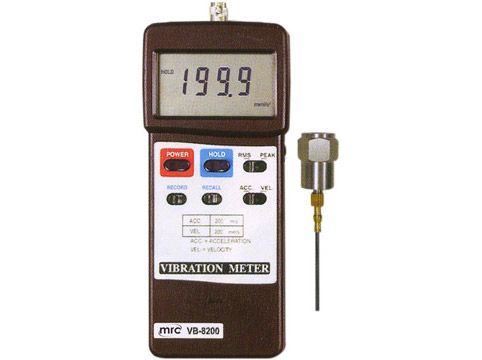The Vibration Meter is a multi-function portable meter that bridges the gap between the basic Vibration Meter and advanced FFT data collector / analyser.
A Vibration meter is used in manufacturing for machine condition monitoring, product testing and quality assurance
Any Vibration meter will measure one or more of the following parameters: vibration acceleration, vibration velocity (speed) and / or vibration displacement.
Application of Vibration Meter
Vibration Meter is a versatile device used across various industries and applications to measure vibrations accurately. Here are some common applications:
Machine Condition Monitoring: Vibration meters are extensively used to monitor the condition of rotating machinery such as motors, pumps, compressors, and turbines. By measuring vibrations, engineers can detect potential faults like misalignment, imbalance, bearing wear, and shaft damage.
Predictive Maintenance: By regularly measuring vibrations, maintenance personnel can predict potential failures in machinery and schedule maintenance activities accordingly. This helps in preventing unexpected downtime and costly repairs.
Quality Control: In manufacturing industries, vibration meters are used to ensure the quality of products by monitoring vibration levels during production processes. Excessive vibrations can indicate manufacturing defects or inconsistencies in the production line.
Structural Health Monitoring: Vibration meters are employed to assess the structural integrity of buildings, bridges, dams, and other civil engineering structures. Monitoring vibrations helps engineers detect any changes in structural behavior caused by factors like environmental conditions, traffic loads, or structural deterioration.
Aerospace and Defense: Vibration meters are crucial for ensuring the reliability and safety of aircraft, spacecraft, and military vehicles. They help in monitoring the performance of critical components and detecting any anomalies that could compromise the vehicle's operation.
Transportation: Vibration meters are used in the automotive and railway industries to assess the performance of vehicles and track infrastructure. They help in identifying issues such as wheel imbalance, track irregularities, and suspension problems.
Research and Development: Vibration meters play a significant role in research and development projects where the behavior of mechanical systems or structures needs to be analyzed under different conditions. Researchers use vibration data to validate theoretical models, study dynamic characteristics, and optimize designs.
Environmental Monitoring: In environmental studies, vibration meters are utilized to monitor the impact of human activities, construction projects, and industrial operations on the surrounding environment. Excessive vibrations can have adverse effects on nearby structures, ecosystems, and human health.
